-

新人教版高中英语必修3Unit 5 The Value of Money-Listening &Speaking&Talking教学设计
4. A:We’d like to have someone to say a word at the beginning to welcome the group.B:↙Who?A:We thought that you or Dr.Johnson might do it.B用降调说Who,其意思是问,对方想让谁在开场时致欢迎词。Step 6 Pronunciation---Practice1. Listen to the short conversation and mark the intonation with ↗, ↙ or ↙, ↗. Then discuss with a partner what they intend to convey by using different intonation.Owner: You know what ?↗ It’s a million-pound bank note↙.Waiter 1: Really ?↗(question)Waiter 2: Really !↙(unbelievable and surprised)Waiter 3: Really ?!↙↗(first question then surprised)2. Listen to the conversations. Underline the parts that are stressed and mark the intonation. Then talk about the implied meanings of the responses with different intonations. Listen again and repeat.1) Henry: It’s a nice suit.Owner: Oh, it’s perfect!↙(The intonation means it is very suitable for Henry.)2) Henry: Well, that’s very kind of you.Owner: Kind, sir ?↗(what you said is not right) No, it’s kind of you. You must come whenever you want and have whatever you like. Just having you sit here is a great honour !!↙(welcome you to come again)3)Henry:Well, to be honest, I have none. Oliver:(happily) What luck!(excited) Brother↗, what luck!↙(It means “Didn’t you hear it?”)Henry: Well, it may seem lucky to you but not to me!↗(angry) If this is your idea of some kind of joke, I don’t think it’s very funny. Now if you’ll excuse me, I ought to be on my way.↙(If so, I would leave.)Roderick: Please don’t go↙...(hope Henry can wait for a moment)Part B Viewing and Talking---Describe people’s changing attitudes in a film clipStep 1 Before-listening---Tell the filmYou are going to watch part of the film The Million Pound Bank Note. Look at these photos and guess what happens in the film.

新人教版高中英语必修3Unit 5 The Value of Money-Listening &Speaking教学设计
Step 4: Listen again and decide if the following statements are true (T) or false (F).1 It was the first time Chen Liyan's story was reported. T口 F口2 Chen found 10,000 yuan in a small plastic bag in Taiyuan railway station口 F口3 Wang Zheng apologized to Chen because he couldn't offer her more money. T口 F口4 Chen took out a large loan to cure her daughter, T口 F口5 Wang set up a fundraising website for Chen's daughter after Chen told him about her situation. T口 F口Step 5:After listening, discuss the questions.1 What kind of person do you think Chen Liyan is?Chen Liyan is generous and honest because she returned a large sum of money to the owner.2 Did Chen return the money because she didn't need it?No. She returned the money because it was the right thing to do. Evidence for this is that she refused to accept the reward money because she felt that it had not been earned. 3 Is it common for people to do what Chen did?It depends on the culture. In some countries it is quite common to return money that has been found. In other countries, people believe "Finders are keepers!" 4 How did Wang Zheng feel about the return of his money?He must have been very happy and relieved to have gotten his money back. We know this because he thanked Chen repeatedly and even offered her a reward.5 Why did Ma Dongbao tell Wang about Chen's family?He must have had great sympathy for Chen and her daughter and wanted to help them.'We know this because he arranged help for them. 6 How did the news reporter feel about Chen's actions?The news reporter felt that it showed that money wasn't the most important thing in life. We know this because the reporter told us that this is what Chen believes. and then said, “that's a great attitude to take."

新人教版高中英语必修3Unit 5 The value of money-Reading and Thinking教学设计二
? Could you offer me some kind of work here?? I don’t want your charity, I just want an honest job.? Careless: I landed in Britain by accident.Step 7:Consolidation.? Find Henry? Roderick and Oliver were I .making a bet when they saw Henry, a poor young man. ? Know Henry? About a month ago, Henry was sailing and later he found himself carried out to sea by a strong wind. Fortunately, he 2.was spotted by a ship. And it was the ship that brought him to 3.England? Offer money to Henry ? Oliver and Roderick gave Henry a letter and told him that there was money in it. They 4.persuaded him to accept it, and made him 5.promise that it wouldn't be opened until 2 o'clock.Step 8:Language pointsa large amount of: a large quantity of; a great deal ofe.g. They bought a large amount of furniture before they moved their new house.make a bet: make an arrangement to risk money, etc. on an event of which the result is doubtful.e.g. We made a bet on the result of the match.permit sb to do something: allow somebody to do somethinge.g. My mother doesn’t permit me to ride in the street after it rained.by accident: as a result of chancee.g. I only found it by accident.stare at: look at somebody or something with the eyes wide open in a fixed gaze( in astonishment, wonder, fear, etc)to be honest: to tell you the truth; to be franke.g. To be honest, I don’t think we have a chance of winning.Step7 Homework:What do you think will happen to Henry? Will the bank-note help him or get him into trouble?

新人教版高中英语必修3Unit 5 The Value of Money-Reading and Thinking教学设计一
Everybody wants to get wealth.In today’s material world,making money or becoming wealthy symbolizes a person’s success and capability. Many people just make every effort, pay any price to attain greater wealth. With money,they can buy nice, large apartments in nice neighborhood. With money they can own luxurious cars. Wealth seems to bring all happiness in life.But is wealth the only road to happiness? Not really. There are many things in the world, which are beyond the means of money, such as friendship, love, health and knowledge. People are so preoccupied with struggling for money that they have no time or would not take the time to form or maintain friendship. What happiness can they feel living as lonely miserable creatures without love or friends in the world even if they accumulate tremendous wealth?In my opinion, people can’t do anything without money, but money is not everything. What money will bring you depends on your personal belief and goal in life. If you are kind enough to help others, especially the poor, money is a good thing to you. With it, you can do much more for the benefit of people and your country, and it will add to your own happiness. If you want money just for your own needs, you’ll never be satisfied or happy. In a word,you should have money spent for more people. Only then can money be the source of your happiness.Step 8 Homework4 students in a group, one acts Roderick, one Oliver, one servant and the fourth one acts Henry Adams, then listen to the tape, pay more attention to the difference between American English and British English in pronunciation, stress, tone.

新人教版高中英语必修3Unit 5 The Value of Money-Reading for Writing教学设计二
2. 您能看到, 我头发太长了。You can see that my hair is much too long.3. 无论什么时候, 只要您想回来就回来。Please come back whenever you want.4. 您仅有很少的头发要理! You only have too little hair to cut !5. 为您服务是我的荣幸!It is my honour to serve you!Step 9 Writing(Henry is walking down the street when he sees a sign for a place that cuts hair. He decides to have it cut. )H=Henry B=BarberH: Good afternoon, I’d like to have my hair cut, if I may. (The barber looks at Henry’s hair and continues cutting another man’s hair. ) Er, I’d really like a haircut. As you can see it’s much too long. B: (in a rude manner) Yes, I can see that. Indeed, I can. H: Fine, well, I’ll have a seat then. (He sits in one of the barber’s chairs. The barber turns to look at Henry. )B: It’s quite expensive here, you know! Are you sure you can afford it?H: Yes. I think so. (After his hair is cut, the barber tells Henry how much he must pay. Henry shows the barber the bank note. )B: Why Mr. . . (looks shocked)H: Adams. Henry Adams. I’m sorry. I don’t have any change. B: Please don’t worry! (wearing a big smile) Nothing to worry about! Nothing at all! Please come back whenever you want, even if you only have too little hair to cut! It will be my honour to serve you!Step 10 Pair workExchange drafts with a partner. Use this checklist to help your partner revise his/her draft.1. Are all the elements of a play included and in good order ?2. Do the character use suitable language ?3. Are the stage directions clear and useful ?4. Is the plot clear and exciting enough ?

新人教版高中英语必修3Unit 5 the value of money-Reading For Writing教学设计一
【参考范文】Narrator:(Henry is smiling as he leaves the restaurant. As he is walking down the street, he sees a sign for a place that cuts hair. He decides to get it cut. )H=Henry;B=Barber;R=rude manH:Good afternoon, I'd like to get a cut, if I may. (The barber looks at Henry's hair and continues cutting another man's hair. )Er, I'd really like a haircut. As you can see it's much too long. B:(in a rude manner) Yes, I can see that. Indeed, I can. H:Fine, well I'll have a seat then. (He sits in one of the barber's chairs. The barber turns to look at Henry. )B:It's quite expensive here, you know!Are you sure you can afford it?H:Yes. I think so. (In comes the rude man. )R:Hey you there. I need a haircut quickly. Can you do me straightaway?B:All right, then, get in the chair and I'll see what I can do. R:Thank you. (sits down in one of the barber's chairs)H:Excuse me, but I was here first. Aren't you going to do my hair first?B:This man's in a hurry. H:Well so am I!I insist that you cut my hair first. B:OK, but I'll have to be quick. This gentleman is waiting. H:Thank you. (They both become quiet. After his hair is cut, the barber tells Henry how much he must pay. Henry shows the barber the bank note. )B:Why, Mr . . . (looks shocked)H:Adams. Henry Adams. I'm sorry, I don't have any change. R:You're that Mr Adams! Well,I'm glad I waited or I might never have known it was you. B:Why, Mr Adams, please don't worry!(wearing a big smile) Nothing to worry about!Nothing at all!Please come back any time, even if you only need too little hairs cut!It will be my honour to serve you!

新人教版高中英语选修2Unit 1 Science and Scientists-Learning about Language教学设计
Step 7: complete the discourse according to the grammar rules.Cholera used to be one of the most 1.__________ (fear) diseases in the world. In the early 19th century, _2_________ an outbreak of cholera hit Europe, millions of people died. But neither its cause, 3__________ its cure was understood. A British doctor, John Snow, wanted to solve the problem and he knew that cholera would not be controlled _4_________ its cause was found. In general, there were two contradictory theories 5 __________ explained how cholera spread. The first suggested that bad air caused the disease. The second was that cholera was caused by an _6_________(infect) from germs in food or water. John Snow thought that the second theory was correct but he needed proof. So when another outbreak of cholera hit London in 1854, he began to investigate. Later, with all the evidence he _7_________ (gather), John Snow was able to announce that the pump water carried cholera germs. Therefore, he had the handle of the pump _8_________ (remove) so that it couldn't be used. Through his intervention,the disease was stopped in its tracks. What is more, John Snow found that some companies sold water from the River Thames that __9__________________ (pollute) by raw waste. The people who drank this water were much more likely _10_________ (get) cholera than those who drank pure or boiled water. Through John Snow's efforts, the _11_________ (threaten) of cholera around the world saw a substantial increase. Keys: 1.feared 2.when 3. nor 4.unless 5.that/which 6.infection 7.had gathered 8.removed 9.was polluted 10.to get 11. threat

新人教版高中英语选修2Unit 1 Science and Scientists-Using langauge教学设计
This happens because the dish soap molecules have a strong negative charge, and the milk molecules have a strong positive charge. Like magnets, these molecules are attracted to each other, and so they appear to move around on the plate, taking the food coloring with them, making it look like the colors are quickly moving to escape from the soap.Listening text:? Judy: Oh, I'm so sorry that you were ill and couldn't come with us on our field trip. How are you feeling now? Better?? Bill: Much better, thanks. But how was it?? Judy: Wonderful! I especially liked an area of the museum called Light Games.it was really cool. They had a hall of mirrors where I could see myself reflected thousands of times!? Bill: A hall of mirrors can be a lot of fun. What else did they have?? Judy: Well, they had an experiment where we looked at a blue screen for a while, and then suddenly we could see tiny bright lights moving around on it. You'll never guess what those bright lights were!? Bill: Come on, tell me!? Judy: They were our own blood cells. For some reason, our eyes play tricks on us when we look at a blue screen, and we can see our own blood cells moving around like little lights! But there was another thing I liked better. I stood in front of a white light, and it cast different shadows of me in every color of the rainbow!? Bill: Oh, I wish I had been there. Tell me more!? Judy: Well, they had another area for sound. They had a giant piano keyboard that you could use your feet to play. But then, instead of playing the sounds of a piano, it played the voices of classical singers! Then they had a giant dish, and when you spoke into it, it reflected the sound back and made it louder. You could use it to speak in a whisper to someone 17 meters away.? Bill: It all sounds so cool. I wish I could have gone with you? Judy: I know, but we can go together this weekend. I'd love to go there again!? Bill: That sounds like a great idea!

新人教版高中英语选修2Unit 2 Bridging Cultures-Discovering useful structures教学设计
The grammar of this unit is designed to review noun clauses. Sentences that use nouns in a sentence are called noun clauses. Nominal clauses can act as subject, object, predicate, appositive and other components in compound sentences. According to the above-mentioned different grammatical functions, nominal clauses are divided into subject clause, object clause, predicate clause and appositive clause. In this unit, we will review the three kinds of nominal clauses. Appositive clauses are not required to be mastered in the optional compulsory stage, so they are not involved.1. Guide the students to judge the compound sentences and determine the composition of the clauses in the sentence.2. Instruct students to try to learn grammar by generalizing grammar rules, controlling written practice, and semi-open oral output.3. Inspire the students to systematize the function and usage of noun clause1.Instruct students to try to learn grammar by generalizing grammar rules, controlling written practice, and semi-open oral output.2.Inspire the students to systematize the function and usage of noun clauseStep1: The teacher ask studetns to find out more nominal clauses from the reading passage and udnerline the nominal clauses.

新人教版高中英语选修2Unit 3 Food and Culture-Discovering useful structures教学设计
The newspaper reported more than 100 people had been killed in the thunderstorm.报纸报道说有一百多人在暴风雨中丧生。(2)before、when、by the time、until、after、once等引导的时间状语从句的谓语是一般过去时,以及by、before后面接过去的时间时,主句动作发生在从句的动作或过去的时间之前且表示被动时,要用过去完成时的被动语态。By the time my brother was 10, he had been sent to Italy.我弟弟10岁前就已经被送到意大利了。Tons of rice had been produced by the end of last month. 到上月底已生产了好几吨大米。(3) It was the first/second/last ... time that ...句中that引导的定语从句中,主语与谓语构成被动关系时,要用过去完成时的被动语态。It was the first time that I had seen the night fact to face in one and a half years. 这是我一年半以来第一次亲眼目睹夜晚的景色。(4)在虚拟语气中,条件句表示与过去事实相反,且主语与谓语构成被动关系时,要用过去完成时的被动语态。If I had been instructed by him earlier, I would have finished the task.如果我早一点得到他的指示,我早就完成这项任务了。If I had hurried, I wouldn't have missed the train.如果我快点的话,我就不会误了火车。If you had been at the party, you would have met him. 如果你去了晚会,你就会见到他的。

新人教版高中英语选修2Unit 3 Food and Culture-Reading and thinking教学设计
The discourse explores the link between food and culture from a foreign’s perspective and it records some authentic Chinese food and illustrates the cultural meaning, gerography features and historic tradition that the food reflects. It is aimed to lead students to understand and think about the connection between food and culture. While teaching, the teacher should instruct students to find out the writing order and the writer’s experieces and feelings towards Chinese food and culture.1.Guide the students to read the text, sort out the information and dig out the topic.2.Understand the cultural connotation, regional characteristics and historical tradition of Chinese cuisine3.Understand and explore the relationship between food and people's personality4.Guide the students to use the cohesive words in the text5.Lead students to accurately grasp the real meaning of the information and improve the overall understanding ability by understanding the implied meaning behind the text.1. Enable the Ss to understand the structure and the writing style of the passage well.2. Lead the Ss to understand and think further about the connection between food and geography and local character traits.Step1: Prediction before reading. Before you read, look at the title, and the picture. What do you think this article is about?keys:It is about various culture and cuisine about a place or some countries.
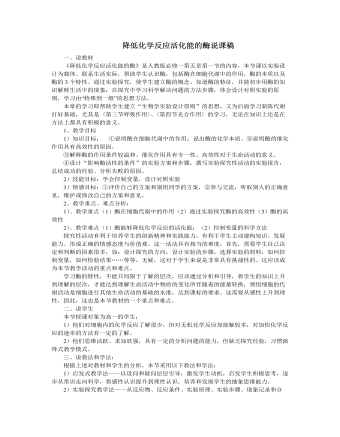
人教版高中生物必修1降低化学反应活化能的酶说课稿
实验是学习生物的手段和基础,是培养学生分析问题、解决问题的能力及创造能力的载体。新课程倡导:强调过程,强调学生探索新知识的经历和获得新知的体验,不能在让教学脱离学生的内心感受,必须让学生追求过程的体验。并且每年高考都有对生物学实验的考查,而且比例越来越重,而学生的失分比例大,主要在于他们没有完整的生物实验设计模式,考虑问题欠缺,本节安排在第二课时完整讲述高中生物学实验设计,是以学生在第一课时和前面探究实验接触的前提下,完整体验生物实验设计模式,为后面学习探究实验打下基础,也为培养学生分析问题、解决问题从一开始就打好基础。五、说教学过程:第一课时联系生活,导入新课,激发学生学习兴趣→细胞代谢→问题探究,酶在代谢中的作用,掌握科学实验方法→酶的本质,运用方法,自主归纳获取新知→小结练习,突出重点易化难点
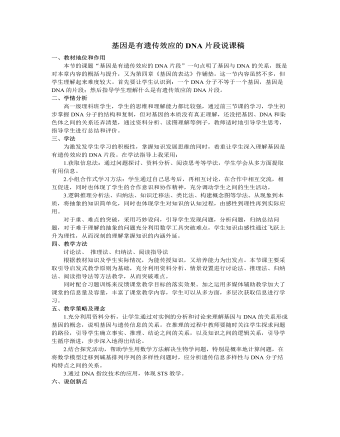
人教版高中生物必修2基因是有遗传效应的DNA片段说课稿
1.基因的化学组成:每个基因含有成百上千个脱氧核苷酸。讲述:基因的脱氧核苷酸排列顺序代表遗传信息。2.基因不同的实质:不同的基因,四种脱氧核苷酸的排列顺序不同,但是每个基因都有特定的排列顺序。3.基因的位置:染色体是基因的主要载体,每个染色体含有一个DNA分子,每个DNA分子含有多个基因,基因在染色体上呈直线排列。4.基因是有遗传效应的DNA片段这就是说,基因是DNA的片段,但必须具有遗传效应(指具有复制、转录、翻译、重组突变及调控等功能)。有的DNA片段属间隔区段,没有控制性状的作用,这样的DNA片段就不是基因。控制某种性状的基因有特定的DNA片段,蕴含特定的遗传信息,可以切除,可以拼接到其他生物的DNA上,从而获得某种性状的表达。例如:把牛的胰岛素基因拼接到大肠杆菌的DNA上,大肠杆菌可以生产胰岛素。
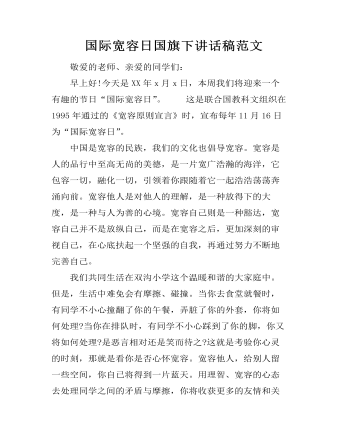
国际宽容日国旗下讲话稿范文
敬爱的老师、亲爱的同学们:早上好!今天是XX年x月x日,本周我们将迎来一个有趣的节日“国际宽容日”。 这是联合国教科文组织在1995年通过的《宽容原则宣言》时,宣布每年11月16日为“国际宽容日”。中国是宽容的民族,我们的文化也倡导宽容。宽容是人的品行中至高无尚的美德,是一片宽广浩瀚的海洋,它包容一切,融化一切,引领着你跟随着它一起浩浩荡荡奔涌向前。宽容他人是对他人的理解,是一种放得下的大度,是一种与人为善的心境。宽容自己则是一种豁达,宽容自己并不是放纵自己,而是在宽容之后,更加深刻的审视自己,在心底扶起一个坚强的自我,再通过努力不断地完善自己。我们共同生活在双沟小学这个温暖和谐的大家庭中。但是,生活中难免会有摩擦、碰撞。当你去食堂就餐时,有同学不小心撞翻了你的午餐,弄脏了你的外套,你将如何处理?当你在排队时,有同学不小心踩到了你的脚,你又将如何处理?是恶言相对还是笑而待之?这就是考验你心灵的时刻,那就是看你是否心怀宽容。宽容他人,给别人留一些空间,你自已将得到一片蓝天。用理智、宽容的心态去处理同学之间的矛盾与摩擦,你将收获更多的友情和关爱。
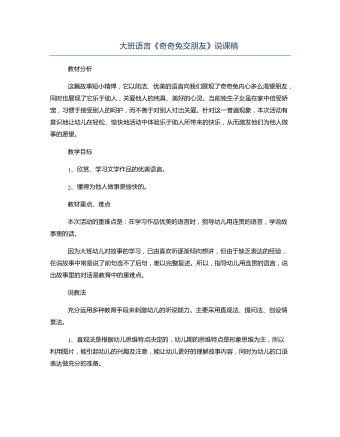
大班语言《奇奇兔交朋友》说课稿
这篇故事短小精悍,它以简洁、优美的语言向我们展现了奇奇兔内心多么渴望朋友,同时也展现了它乐于助人,关爱他人的纯真、美好的心灵。当前独生子女虽在家中倍受娇宠,习惯于接受别人的呵护,而不善于对别人付出关爱。针对这一普遍现象,本次活动有意识地让幼儿在轻松、愉快地活动中体验乐于助人所带来的快乐,从而激发他们为他人做事的愿望。教学目标1、欣赏、学习文学作品的优美语言。2、懂得为他人做事是愉快的。教材重点、难点本次活动的重难点是:在学习作品优美的语言时,指导幼儿用连贯的语言,学说故事里的话。因为大班幼儿对故事的学习,已由喜欢听逐渐倾向想讲,但由于缺乏表达的经验,在说故事中常是说了前句连不了后句,难以完整复述。所以,指导幼儿用连贯的语言,说出故事里的对话是教育中的重难点。
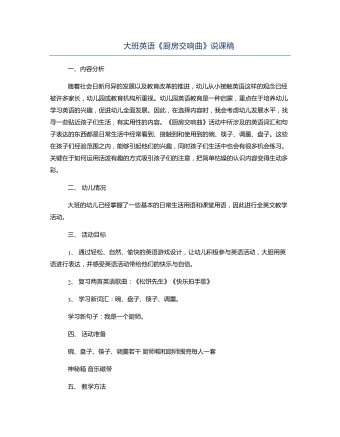
大班英语《厨房交响曲》说课稿
二、幼儿情况大班的幼儿已经掌握了一些基本的日常生活用语和课堂用语,因此进行全英文教学活动。三、活动目标1、通过轻松、自然、愉快的英语游戏设计,让幼儿积极参与英语活动,大胆用英语进行表达,并感受英语活动带给他们的快乐与自信。2、复习两首英语歌曲:《松饼先生》《快乐拍手歌》3、学习新词汇:碗、盘子、筷子、调羹。学习新句子:我是一个厨师。四、活动准备碗、盘子、筷子、调羹若干厨师帽和厨师围兜每人一套神秘箱音乐磁带五、教学方法1、游戏法孩子生来是好动的,是以游戏为生命的。游戏化教学有着其他活动不能代替的功能和价值。英语与游戏的结合,能充分激起幼儿学英语的兴趣,密切师幼关系,尤其能提供给幼儿轻松自然愉快运用英语的机会。2、直接法全英文教学形式,直接培养幼儿简单英语思维以及表达习惯。3、重复法不断重复单词与句型,刺激幼儿印象,强化巩固记忆。4、赏识教育法鼓励与表扬幼儿的每一次进步,培养孩子们的兴趣,并帮助他们树立信心。六、活动过程1、问候2、句子:我是一个厨师把小朋友打扮成厨师,引起幼儿兴趣。学习句子:我是一个厨师。热身歌曲:《松饼先生》3、游戏——神秘箱。引出活动新内容——碗、盘子、筷子、调羹。(教师示范奏乐)4、游戏——找、找、找。播放音乐,幼儿在教室里寻找碗、盘子、筷子、调羹。5、幼儿分组向大家介绍自己找到的东西,并分组奏乐。

人教A版高中数学必修一对数的运算教学设计(2)
学生已经学习了指数运算性质,有了这些知识作储备,教科书通过利用指数运算性质,推导对数的运算性质,再学习利用对数的运算性质化简求值。课程目标1、通过具体实例引入,推导对数的运算性质;2、熟练掌握对数的运算性质,学会化简,计算.数学学科素养1.数学抽象:对数的运算性质;2.逻辑推理:换底公式的推导;3.数学运算:对数运算性质的应用;4.数学建模:在熟悉的实际情景中,模仿学过的数学建模过程解决问题.重点:对数的运算性质,换底公式,对数恒等式及其应用;难点:正确使用对数的运算性质和换底公式.教学方法:以学生为主体,采用诱思探究式教学,精讲多练。教学工具:多媒体。一、 情景导入回顾指数性质:(1)aras=ar+s(a>0,r,s∈Q).(2)(ar)s= (a>0,r,s∈Q).(3)(ab)r= (a>0,b>0,r∈Q).那么对数有哪些性质?如 要求:让学生自由发言,教师不做判断。而是引导学生进一步观察.研探.

人教A版高中数学必修一对数的运算教学设计(1)
本节课是新版教材人教A版普通高中课程标准实验教科书数学必修1第四章第4.3.2节《对数的运算》。其核心是弄清楚对数的定义,掌握对数的运算性质,理解它的关键就是通过实例使学生认识对数式与指数式的关系,分析得出对数的概念及对数式与指数式的 互化,通过实例推导对数的运算性质。由于它还与后续很多内容,比如对数函数及其性质,这也是高考必考内容之一,所以在本学科有着很重要的地位。解决重点的关键是抓住对数的概念、并让学生掌握对数式与指数式的互化;通过实例推导对数的运算性质,让学生准确地运用对数运算性质进行运算,学会运用换底公式。培养学生数学运算、数学抽象、逻辑推理和数学建模的核心素养。1、理解对数的概念,能进行指数式与对数式的互化;2、了解常用对数与自然对数的意义,理解对数恒等式并能运用于有关对数计算。

人教A版高中数学必修一对数的概念教学设计(2)
对数与指数是相通的,本节在已经学习指数的基础上通过实例总结归纳对数的概念,通过对数的性质和恒等式解决一些与对数有关的问题.课程目标1、理解对数的概念以及对数的基本性质;2、掌握对数式与指数式的相互转化;数学学科素养1.数学抽象:对数的概念;2.逻辑推理:推导对数性质;3.数学运算:用对数的基本性质与对数恒等式求值;4.数学建模:通过与指数式的比较,引出对数定义与性质.重点:对数式与指数式的互化以及对数性质;难点:推导对数性质.教学方法:以学生为主体,采用诱思探究式教学,精讲多练。教学工具:多媒体。一、 情景导入已知中国的人口数y和年头x满足关系 中,若知年头数则能算出相应的人口总数。反之,如果问“哪一年的人口数可达到18亿,20亿,30亿......”,该如何解决?要求:让学生自由发言,教师不做判断。而是引导学生进一步观察.研探.
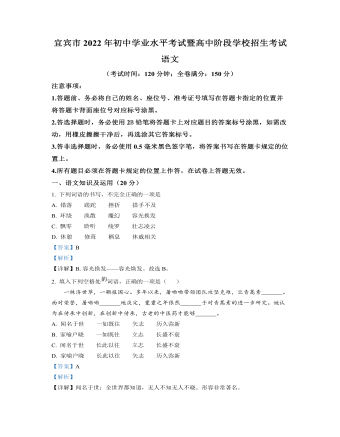
2022年四川省宜宾市中考语文真题(解析版)
①我要笑遍世界。②只有人类才会笑。树木受伤时会流“血”,禽兽会因痛苦和饥饿而哭嚎哀鸣。然而,只有我才具备笑的天赋,可以随时开怀大笑。从今往后,我要培养笑的习惯。③笑有助于消化,笑能减轻压力,笑是长寿的秘方。现在我终于掌握了它。④我要笑遍世界。

